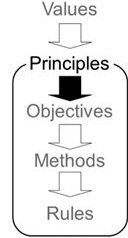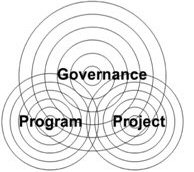Level 4 Governance
There are a number of distinguishing features that require a different approach
to Level 4 than the previous three levels. These features are:
Level 4 is an open system concept where the roll out of the initiate is subject
to external determinacies and both internal and external stakeholders determine
success, hence the three-dimensional chess metaphor.
 Level 4
is thus a matter of governance, not management. Level 4
is thus a matter of governance, not management.
Level 4 is not about implementing a preconceived solution. It is about considering
a business case of a proposed direction, testing it with the external determinacies
and adjusting the formulation based on what the governance network determines.
In DBM parlance, Level 4 entails a dynamic objective; the only stabilizing
context linking project practitioners with the end-user is appeal to the common
principles of the organization.
 The corporate
IT implementers and the corporate end user base at least share a common set of
corporate principles. This is a fixed-principles reference within the DBM. Unlike
Level 3 projects, Level 4 entails a dynamic objective. The project may
launch with a notionally fixed objective, a precept that will only be tested and
adjusted by the corporation's end user base. These end users are not under the
management control of the IT project manager. With this, the term for this role
has become "Project Champion" suggesting the individual falls somewhere between
Project Advocate and Cheer Leader. The corporate
IT implementers and the corporate end user base at least share a common set of
corporate principles. This is a fixed-principles reference within the DBM. Unlike
Level 3 projects, Level 4 entails a dynamic objective. The project may
launch with a notionally fixed objective, a precept that will only be tested and
adjusted by the corporation's end user base. These end users are not under the
management control of the IT project manager. With this, the term for this role
has become "Project Champion" suggesting the individual falls somewhere between
Project Advocate and Cheer Leader.
The Level 2 attempt at Solidify Baselines is short lived as the project management
change control loop heats up like a hot wire. The half-life of associated schedules,
cost estimates and contracts can be measured in days, not years. The reply from
senior management to dysfunctional projects is to apply more anxiety — rather
than undertaking the more intellectual posture of seeing the Level 4 for what
it is.
Governance, meaning "corporate governance", is the basis for bringing the purpose
of the organization together with the purpose of the enterprise project and enabling
the unfolding new Darwin-forged reality.
The ability to bring the disparate forces together, instilling trust and relying
on that trust for a harmonized implementation is key, while reconciling those
in the "Business Process Reengineering" equation losing to the fact that life
has changed.
The Enterprise IT example
The Mike Hammer[5] era of business transformation
took hold in the late 1990s. The invention of the desktop PC and the networking
of them to enterprise business-emulating communications tools created an alignment
of business logic that was never considered in the formative stages of the business
operations. Gone was the era of the monolithic impenetrable company fortress,
and the new externally friendly open communication world was ushered in. The CEO
was not there to control the ship, but to sail it!
Management delayering enabled greater connectivity between senior leadership
and the company's workers who then undertook hand-to-hand combat in the halls
to survive.
Of course, through this swift transformation, many a company went the way of
the dinosaur as the true experience of Level 4 initiatives became apparent. IT
was the catalyst for a re-equilibration of the larger sense of purpose. Putting
the technology aside, the great question that is tested in this exercise is — how relevant is my operation to my swiftly changing surrounds?
5. "Reengineering
the Corporation: A Manifesto for Business Revolution", Hammer, Michael Martin.
Harper Collins, 2003.
|



